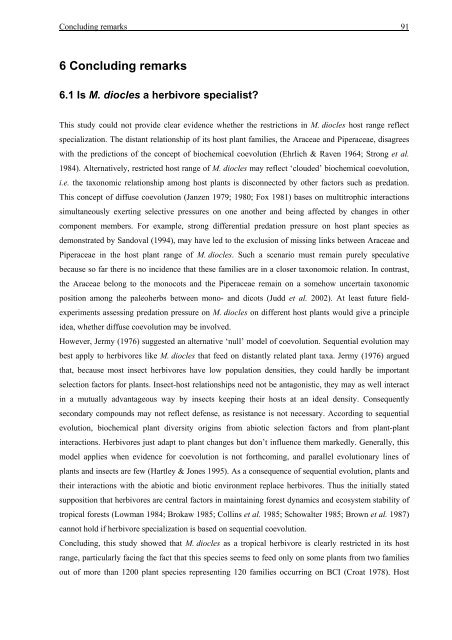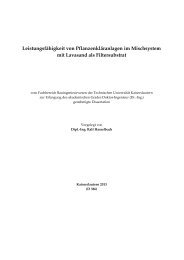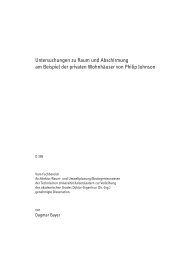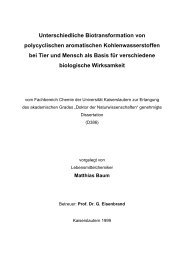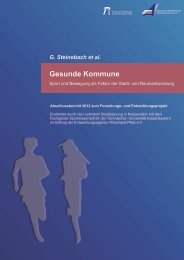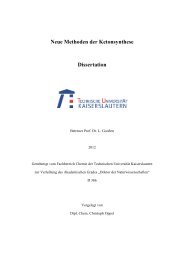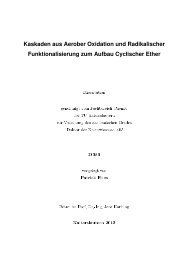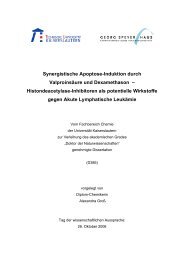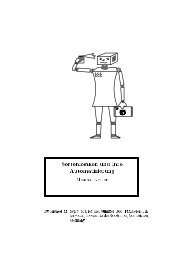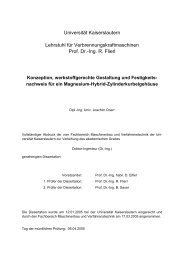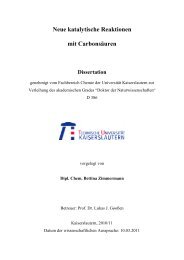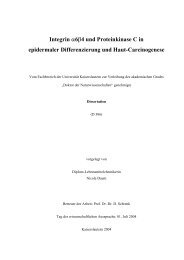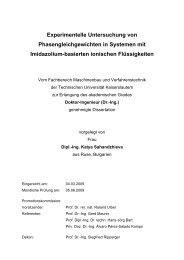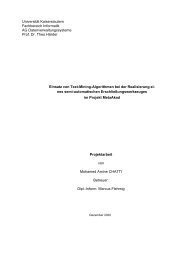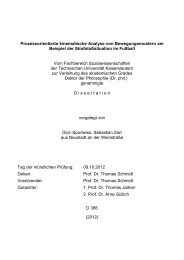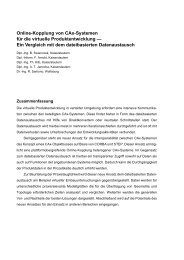ecology of phasmids - KLUEDO - Universität Kaiserslautern
ecology of phasmids - KLUEDO - Universität Kaiserslautern
ecology of phasmids - KLUEDO - Universität Kaiserslautern
Create successful ePaper yourself
Turn your PDF publications into a flip-book with our unique Google optimized e-Paper software.
Concluding remarks 91<br />
6 Concluding remarks<br />
6.1 Is M. diocles a herbivore specialist?<br />
This study could not provide clear evidence whether the restrictions in M. diocles host range reflect<br />
specialization. The distant relationship <strong>of</strong> its host plant families, the Araceae and Piperaceae, disagrees<br />
with the predictions <strong>of</strong> the concept <strong>of</strong> biochemical coevolution (Ehrlich & Raven 1964; Strong et al.<br />
1984). Alternatively, restricted host range <strong>of</strong> M. diocles may reflect ‘clouded’ biochemical coevolution,<br />
i.e. the taxonomic relationship among host plants is disconnected by other factors such as predation.<br />
This concept <strong>of</strong> diffuse coevolution (Janzen 1979; 1980; Fox 1981) bases on multitrophic interactions<br />
simultaneously exerting selective pressures on one another and being affected by changes in other<br />
component members. For example, strong differential predation pressure on host plant species as<br />
demonstrated by Sandoval (1994), may have led to the exclusion <strong>of</strong> missing links between Araceae and<br />
Piperaceae in the host plant range <strong>of</strong> M. diocles. Such a scenario must remain purely speculative<br />
because so far there is no incidence that these families are in a closer taxonomoic relation. In contrast,<br />
the Araceae belong to the monocots and the Piperaceae remain on a somehow uncertain taxonomic<br />
position among the paleoherbs between mono- and dicots (Judd et al. 2002). At least future field-<br />
experiments assessing predation pressure on M. diocles on different host plants would give a principle<br />
idea, whether diffuse coevolution may be involved.<br />
However, Jermy (1976) suggested an alternative ‘null’ model <strong>of</strong> coevolution. Sequential evolution may<br />
best apply to herbivores like M. diocles that feed on distantly related plant taxa. Jermy (1976) argued<br />
that, because most insect herbivores have low population densities, they could hardly be important<br />
selection factors for plants. Insect-host relationships need not be antagonistic, they may as well interact<br />
in a mutually advantageous way by insects keeping their hosts at an ideal density. Consequently<br />
secondary compounds may not reflect defense, as resistance is not necessary. According to sequential<br />
evolution, biochemical plant diversity origins from abiotic selection factors and from plant-plant<br />
interactions. Herbivores just adapt to plant changes but don’t influence them markedly. Generally, this<br />
model applies when evidence for coevolution is not forthcoming, and parallel evolutionary lines <strong>of</strong><br />
plants and insects are few (Hartley & Jones 1995). As a consequence <strong>of</strong> sequential evolution, plants and<br />
their interactions with the abiotic and biotic environment replace herbivores. Thus the initially stated<br />
supposition that herbivores are central factors in maintaining forest dynamics and ecosystem stability <strong>of</strong><br />
tropical forests (Lowman 1984; Brokaw 1985; Collins et al. 1985; Schowalter 1985; Brown et al. 1987)<br />
cannot hold if herbivore specialization is based on sequential coevolution.<br />
Concluding, this study showed that M. diocles as a tropical herbivore is clearly restricted in its host<br />
range, particularly facing the fact that this species seems to feed only on some plants from two families<br />
out <strong>of</strong> more than 1200 plant species representing 120 families occurring on BCI (Croat 1978). Host


